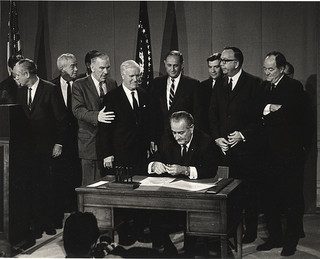Th
—-
Beyond Poverty?
The annual national convention is coming up for my organization, the National Coalition for Asian Pacific American Community Development, and we are going to do something commemorating the 50th anniversary of the War on Poverty during our convention. But, in a recent planning call about the convention, the rest of the staff was resistant to include the word “poverty” in our convention title/theme/tagline.
Being who I am and given that I spend a lot of my time thinking and writing about poverty, I pushed back (gently I hope) about using this national moment, this important anniversary of the War on Poverty, as a national platform to highlight the issues of economic justice and economic vitality that are so core to our work and to our vision and values. But, ultimately, my arguments did not hold sway and our convention title does not include the term poverty. And, despite my arguments during the call, I believe this is the right decision.
The Poverty Terminology
There are lots of technical things wrong with the official, federal poverty statistic. Among other things, it doesn’t include people who live in military barracks, people in prison, foster children, people who live in group homes or residential facilities. It doesn’t account for geographic variations in the cost of living (this, by the way, disproportionately suppresses the poverty rate for AAPIs, who are most concentrated in the highest cost of living regions). It doesn’t account for non-cash benefits (which has led us to undervalue the positive impacts of important safety-net programs such as SNAP, housing vouchers, and affordable housing).
It is an arbitrary cut-off line and many people who we would otherwise consider poor/low-income are technically above the federal poverty line or simply not counted at all (as the examples above). At best, it is a blunt instrument, an imperfect indicator of economic need. But, it has remained useful because it is evocative and weighty—when you say “poverty,” people think that they know what you’re talking about and they think that you’re talking about serious issues.
But part of the reason why the term poverty is weighty is because it is carrying a lot of excess baggage. And this is the heart of the matter. The technical issues above can be fixed with technical tweaks. But the problematic aspects of a poverty discourse are deeply embedded.
At its technical core, poverty is about the lack of income. But, it is not so simple and straightforward as the more boring and precise (and less problematic) HUD/affordable housing industry term of “low-income.” Poverty, whether intentionally or not, carries additional implications of deficits, of shortcomings, of judgments that go way beyond income, way beyond simple dollars and cents. Poverty and the War on Poverty are deeply linked to a notion of a “culture of poverty” that, despite what may have been the best of intentions in the original framing of the concept, is laden with mythologies that are racist, sexist, heteronormative—that are counter to a larger vision of a more just and caring world—and that unfairly blame people for outcomes beyond their control. And, layered upon this, are the ways in which we come to look at whole communities through a prism of shortcomings and overlook the good things that can and should become part of the foundations for our struggles for social and economic justice, for our struggles to make the world a better place.
Economic Justice and Economic Injustice
So how do we talk about economic justice if we’re not talking about poverty? I agree that we have spent too long working from a deficit model and I agree that the term poverty comes loaded with too much negative baggage. And while I believe that assets (defined in a broad sense) should be the fundamental building blocks for a sustainable social change/economic justice, we shouldn’t swing the other way and only talk about positive things. Maybe we need a new vocabulary around economic need?
One of the strengths of the Occupy Movement in its “We are the 99%” framing of economic inequity was that it created a big tent. And though the movement seems to be fading, in its 15-minutes, it shifted the conversation around economic justice and tried to create a frame in which more people could see where they fit in. But, while I admired the Occupy folks for this aspect of their narrative-building, I still would want an economic justice rhetoric to be centrally about the conditions of life on the bottom.
Maybe this makes me more of a stick-in-the-mud, old-school, bleeding-heart traditionalist, but I still think that the worst part about economic inequity/injustice is that so many people have so little. I realize that this is connected to the fact that a few have so much. But, most of the time, the excesses at the top are less compelling for me than the conditions at the bottom. Perhaps because of this personal orientation, I feel like we should still be able to have a big tent and talk about conditions at the bottom of an economic hierarchy.
In building a big tent movement for economic justice, I want a narrative rhetoric that can talk about problems, privileges, advantages, disadvantages, injustices, etc. across a broad spectrum and ultimately end up in a place that is about love and compassion, where we all have each other’s backs, where we are all connected, where we all look after each other. And I feel like we have to talk about economic need to be able to get there. You can’t get to solutions without an understanding of the problems. We still need to be able to articulate the conditions of economic injustice to define our vision of economic justice.
The Next 50 Years
I started this particular post with a small thing about messaging around my organization’s national convention. But all small things are connected to big things. A small thing about messaging is really about how we as an organization are shifting the narrative around poverty, economic need, economic justice, economic vitality and trying to put forth a positive, inspiring vision—one that knows about past and current injustices but is really, mostly about rolling up our sleeves and working toward a better future, together. And this, ultimately, is the reason why it was the right decision not to have the term poverty in our tagline. It’s about rolling up our sleeves and getting on to the business of the next 50 years.
(Photo from the National Institute's of Health Library CC BY-NC-SA)






Thanks, Josh. Occupy’s framing of the 1% versus the rest was troubling to me. I don’t really care about wealthy people’s toys, or even their better access to education and services. 1% of the people (and it’s a 1% whose population changes every year) don’t use up enough resources to lift the poor out of poverty. It’s the system that doesn’t create enough jobs or good schools that I’m concerned about.
Josh,
Thanks for your thoughtful comments on the Myths About Poverty. I was deeply disturbed by the Occupy movement’s concept that the economic justice concept was to be thrown on the backs of the 1%. They didnt create poverty and and they aren’t the ones keeping it alive. Poverty or as we used to call it, “bein’ poor”, has always been a part of every civilization. I think the US does a better than average job of dealing with it overall. The fact is, you don’t realize how much you have til you see truly poor people in other countries and then you can realize how much even the poor have in this country.
Perhaps if folks spent less time fussing over definitions of poverty and more time on creating opportunities for job creation and business creation, the plight of the poor would be less of an issue. The current administration does little to nothing to foster solutions to unemployment in this country, especially among minorities. Its a sad situation to see so many folks needing more work and better pay. However, this country was founded on small business and i see people every day working small business enterprises that supplement and sometimes replace their regular jobs. That can do attitude is still out there and we need to foster it more than the concept of defining what poverty is and who it affects. It affects us all.
The big problem with the 1% is less that they enjoy life disproportionately and more that they control things and use that power for their own benefit, which in turn keeps the poor poor. Their increased separation from everyone else aggravates this. The resources that society generates should be used to benefit everyone to a decent standard. In addition, spreading wealth creates demand that creates employment. Instead America is being impoverished for most people. In the absence of unions employers are able to pay as little as possible and avoid the kind of support people need to thrive. but which can be made to avoid adding to the bottom line. If we were serious about having more small businesses we would make life easier for them but at the same time requiring less sacrificial dedication. Instead most small businesses serve huge corporations in some way like remoras following sharks, and our devotion to them is mostly mythical. The bottom line is that society is made of stakeholders and must, instead of a self seeking 1%, control society’s investment of its resources.
Stan,
Thanks for your comments to the article and the thread. It is clear from your comment and tone that your faith is in big government to rule with an iron fist over us all and bring us all up or down to the same level. Your beliefs would fit well under Joe Stalin except, even in blessed communism, the 1% still rule and are still obscenely wealthy at the expense of the proletariat.
Check out the history books on what transpired in the Soviet Union Stan. It didn’t work then and it wont work now. I will not be doomed to repeat that history Stan.